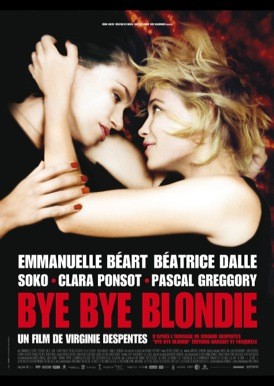Warning: Undefined array key "HTTP_REFERER" in /home/clients/21fad922ace3ab443932632f2260693a/web/wp-content/themes/tarantula/single-film.php on line 25

Bye Bye Blondie
A film by Virginie Despentes, 2012-
Genre: Drama, Comedy
Language: French
Subtitles: xxx
Format: xxx
Sound: xxx
Duration: 97 min
Country: Belgium, France, Swiss
Year: 2012
PRESS KIT
-SYNOPSIS
-A love story of two women who meet up in their late forties and attempt to retrieve the romance they had in their youth.
CREDITS
-Director: Virginie Despentes
Script: Virginie Despentes
Cinematography: Hélène Louvart
Film editing: Martine Giordano
Art direction: Valérie Massadian
Cast: Emmanuelle Béart, Béatrice Dalle, Pascal Grégory, Charlotte Eugène
Produced by Tarantula (Belgium), Frakas (Belgium), Red Star Cinéma (France), Vega Film (Swiss)
FESTIVALS
-Paris Festival Chéries-Chéris
Lyon Festival Ecrans Mixtes
Belfort Festival Libres Regards
DIRECTOR
-
After school, Virginie Despentes left her parents and went to Lyon to study in a film school at the age of 17. Disinterested, she quickly stopped her studies and then had a series of odd jobs: saleswoman, housekeeper at a record store, and even prostitute via Minitel. She then became a freelancer for music magazines and pornographic films critic. While she still works as a saleswoman in a Virgin Megastore, her first novel, “Rape Me”, was released in 1993 and sets her up among the controversial and provocative figures of French literature. Three years later, the young woman released her second novel, “Les chiennes savantes” and goes to the publisher Grasset, with whom she published a third book, “Les jolies choses” in 1998.
Her first incursion in the cinema industry occured in 2000 with the adaptation of her novel “Rape Me”. Provocative and shocking, the film raises controversy, printing the name of Virginie Despentes in the audience minds. Thereafter, it is Gilles Paquet-Brenner which seizes his raw and damaged universe by performing the adaptation of “Les jolies choses”, starring Marion Cotillard and Stomy Bugsy in the lead roles. Alongside, Virginie Despentes continues her literary career with two new novels, “Teen Spirit” in 2002 and “Bye Bye Blondie” in 2004 and also made an immersion in the musical world by working with the English group Placebo (signing the French version of the song “Protect me from what I want”) and translating the novel by Dee Dee Ramone, “Poison Heart: surviving the Ramones”.
She’s back in the picture in 2006 within this very musical sphere, since she directs the video for the song “Tough Luck” by Daniel Darc. Symbol of a literature called “trash” at that time, Despentes ride her nervous style, ironic and uninhibited on all projects, signing prefaces, texts and translations. Although far from the direct activism, she doesn’t hide her feminist side that she develops in a documentary, “Mutantes: Punk Porn Feminism” in 2009, centered on a series of interviews with theorists, intellectuals and artists on the issue of a new feminism that claims a total sexual freedom, such as the “pro-sex” feminist community in the 80’s.
In 2010, she returned to literature with her sixth novel entitled “Apocalypse Baby”, which received the prestigious Prix Renaudot, while continuing her film career two years later with her second feature film, again adapted from one of her novels, “Bye Bye Blondie”, with Béatrice Dalle and Emmanuelle Béart. With this impressive cast, the film deals with several themes close to her work, such as homosexuality, sexual freedom or the nightlife.
VIDEO
-PRESS REVIEWS
-« Il y a deux ou trois idées reçues sur le cas Virginie Despentes que Bye Bye Blondie contredit d’emblée, et avec fougue. »
Romain Blondeau / Les Inrockuptibles
« Comme on l’imagine aisément, le couple formé par ces deux icônes hypersexuelles que sont Béart et Dalle est un plaisir à regarder, d’autant plus qu’elles sont servies par le génie corrosif des dialogues de Despentes. Mais c’est dans la recréation de l’univers englouti de la culture punk du début des années 1980 et de la révolte adolescente qui lui servait de carburant que bat le coeur du film.
Convoquant avec une candeur formidablement attachante la mémoire de film comme China Girl, d’Abel Ferrara, Out of the Blue, de Dennis Hopper, ou encore L’Aventure de Madame Muir, de Joseph L. Mankiewicz, la cinéaste donne l’impression, très communicative, de s’amuser comme une gamine (…) elle met en scène une époque rarement représentée dans le cinéma français en alliant d’une manière unique esprit punk et sensibilité fleur bleue. On en redemande. »
Isabelle Regnier / Le Monde

